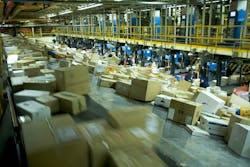A recent report contends that the steep rise in the economic impact of supply chain disruptions over the last three years – caused largely by natural disasters and unplanned system “outages” – is giving fair warning to the transportation and logistics industry that more work needs to be done to mitigate risks from such events.
According to the 2013 Third-Party Logistics Study: The State of Logistics Outsourcing compiled under the auspices of Penn State University, economic losses due to supply chain disruptions increased by 465% over the last three years – climbing from $62 billion in 2009 to well over $350 billion in 2011.
During a conference call hosted by Wall Street firm Stifel Nicolaus last week, Shanton Wilcox – one of the study’s authors and one of the principals at Capgemini Consulting – warned that the probability of supply chain disruptions is only going to increase in the future, with the economic impact of such disruptions increasing as well.
“We also found that roughly 40% of the disruptions we’re sourced to problems with ‘Tier 2’ firms in the supply chain – the suppliers to the main Tier 1 transportation and logistics operators,” Wilcox said. “Yet almost 75% of our shipper survey respondents said they don’t manage suppliers below the Tier 1 level. That’s increasing the risk exposure for shippers.”
This 17thannual survey of the third-party logistics industry – which polled 1,510 shippers, along with 832 third party logistics firms – also determined that 50% of the supply chain disruptions that occurred in 2011 were due to natural disasters, such as earthquakes, tsunamis, volcanic activity and fires. Another 45% of such disruptions were due to what’s called “unplanned system outages,” led by unexpected transportation network disruptions, cyber attacks, and energy scarcity.
Capgemini’s Wilcox also stressed that in many respects shippers and third party logistics (3PL) companies alike may not be investing in the proper tools to help mitigate such disruptions in the future.
For example, he noted that the survey indicated fully 69% of 3PLs and 68% of shippers plan to invest more in supply chain “partnerships” over the next two years, with 62% and 61%, respectively, looking to invest more in business continuity tools during that same time frame.
Yet only 32% of either group plans to invest in supply chain mapping tools, which Wilcox believes is a vital tool to help alleviate the impact of various disruptive events.
“If you don’t understand the structure of your supply chain, you won’t know how to fix it,” he warned. “Remember, 40% of the disruptions come from problems with Tier 2 suppliers and below. They need to be drawn more directly into the discussion about how to mitigate supply chain disruptions moving forward.”
About the Author
Sean Kilcarr
Editor in Chief
Sean Kilcarr is a former longtime FleetOwner senior editor who wrote for the publication from 2000 to 2018. He served as editor-in-chief from 2017 to 2018.
